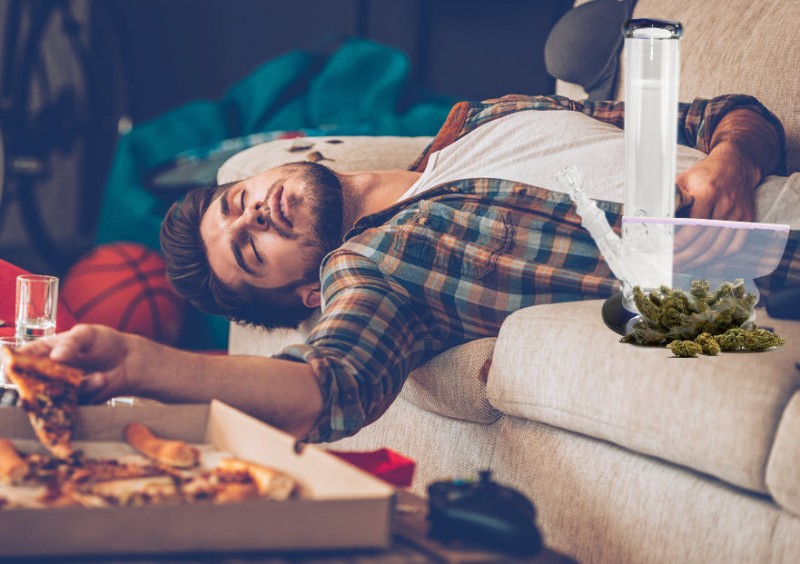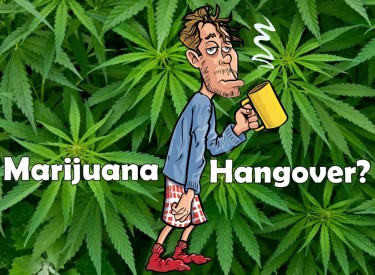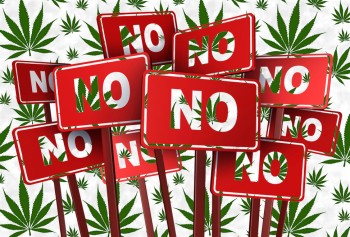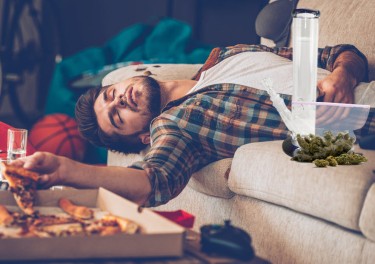
Cannabis ‘Hangovers’ Don’t Affect Next Day Performance, Says New Study
Weed hangovers: we’ve all been there.
You may have smoked too many joints the day before, one too many huge puffs off a bong, or consumed really potent edibles. Then the next day, you wake up feeling groggy and tired, similar to how you would feel if you knocked back a few drinks the day before. This time around, the weed hangover is less brutal compared to one caused by alcohol. The headaches, if any, are milder but you still feel…. Off. In many cases, you may wake up still high.
Other possible symptoms of a weed hangover include:
-
Nausea
-
Dehydration
-
Lightheadedness
-
Difficulty concentrating
Little is known so far of cannabis hangovers. We do know that the THC content in weed does contribute to it.
The good news is that cannabis hangovers won’t stunt your performance the next day in the same way that alcohol does. And there’s a new study out there to back it up.
The study, which was published in Cannabis and Cannabinoid Research, is the first of its kind to review the ‘cannabis hangover’ phenomenon caused by marijuana use. It was conducted by Dr. Danielle McCartney, a Research Fellow at the University of Sydney’s Lambert Initiative for Cannabinoid Therapeutics together with her colleagues Professor Iain McGregor and Anastacia Suraev.
For the study, the researchers analyzed 20 existing studies that looked at how THC affected users over 8 hours after consumption. The studies made use of 345 performance tests throughout, but just 12 of them, which is 3.5%, showed that there was significant deterioration in performance the next day. In addition, none of these studies utilized randomized double-blind placebo-controlled study designs, and the studies were all older than 18 years.
‘Most studies didn’t detect ‘next day’ effects of cannabis use, and the few that did had significant limitations,” explains Dr. McCartney to the University of Sydney. “Overall, it appears that there is limited scientific evidence to support the assertion that cannabis use impairs ‘next day’ performance,” he says.
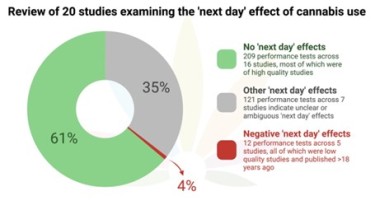
Source: Lambert Initiative For Cannabinoid Therapeutics
“We can’t really comment on the magnitude of these effects because they weren’t all that well reported,” says Dr. McCartney. “They didn’t appear to be associated with a specific dose of THC, route of administration or type of assessment,” he says.
They went on to explain how understanding next day performance is important because it can affect consumers who work safety-sensitive jobs, or have to drive the next day.
Dr. McCartney acknowledges that THC can remain in the body for a longer time, so knowing the level of impairment, if any, is crucial to safety. “Policy makers should bear in mind that the implementation of very conservative workplace regulations can have serious consequences, such as termination of employment with a positive drug test,” write the authors. “They can also impact the quality of life of individuals who are required to abstain from medicinal cannabis used to treat conditions such as insomnia or chronic pain for fear of a positive workplace or roadside drug test,” they said.
How to Manage Your Weed Hangovers
Even if cannabis hangovers have very little impact on your performance the next day, many people don’t enjoy the feeling of it. However, you can avoid or minimize these effects: you have total control on the amount of cannabis you smoke or the edibles you eat. Of course, you first have to identify which strains or cannabis products make you prone to these in the first place.
Practicing moderation is key. There is a reason why people are always advised to start slow and go slow when it comes to cannabis; more is not always better. Individuals are also more prone to suffering from cannabis hangovers if you consume highly potent THC products such as extracts and edibles.
Here’s what else you can do to manage your weed hangovers the next day:
-
Get enough nourishment: If you are feeling fatigued or lethargic, make sure that you are giving your body the fuel that it needs. Prioritize your water intake and eat healthy food. Water consumption will reduce any dehydration you may be feeling as a result of THC; and remember that dehydration may also accumulate from the night before. Take electrolytes as well, such as food and drinks that are rich in magnesium, sodium, and potassium.
-
Take some CBD: THC’s non-psychoactive sibling, CBD, is well-known for its ability to act as an antidote to feeling ‘too high’ – and this can help with ‘hangovers’ the next day too. The night before, if you already feel that you’re too high, consuming some CBD in the form of capsules, edibles, or oils can mitigate the hangover the next day. Supplementing with more CBD the following day if you still feel bad can help take the edge off a little bit.
-
Sweat it out: Whatever you like to do for exercise – go do it. Get your blood pumping and work up a good sweat to help clear out your brain fog, enjoy the endorphins, and feel better. Whether it’s yoga, boxing, running, or even going on a long walk – it will help make you feel better.
-
Get fresh air: Go outside of your house to enjoy some fresh air. Breathe deeply while you walk to give your lungs and body a good dose of new oxygen, since this can help eliminate the brain fog too.
-
Sleep: Many find that the best remedy for a weed hangover is good old sleep. If you don’t have to go to work or are just at home with a flexible working schedule, sleeping it off is the best way to recover.
